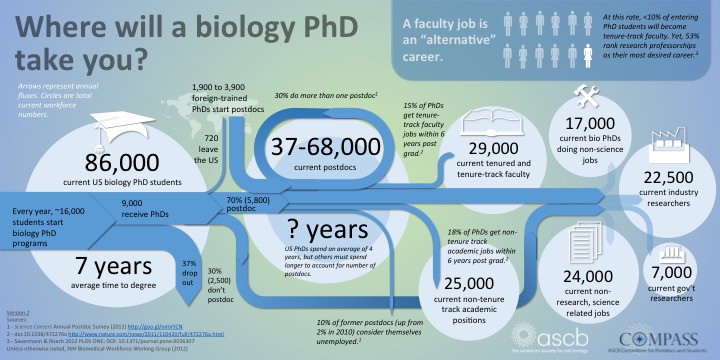Nature recently published results from their fifth survey among PhD students worldwide. The survey assessed the satisfaction of the PhD program and life during and after the PhD, including career prospects. 6,300 students participated in the study, and the results are an excellent representation of the issues faced by early career researchers in the current academic system.
Students are happy they chose to do grad studies
Overall, most students seem happy with the choice they’ve made to pursue a PhD, with 75% answering they are at least somewhat satisfied. However, considering whether their enthusiasm changed after starting their programs, half of the respondents stated that their interest had increased, and half of them said it had been reduced. Various reasons exist for a negative experience, and the main frustrations are the training itself, work-life balance, bullying or harassment, and cloudy job prospects. Some of the most positive things people said about their work was that they are being intellectually challenged and get to work in a stimulating environment with bright people.
Careers in Academia
Most of the survey respondents saw working in academia as their long term career goal. Research clearly has the preference for PhD students, as the second most common choice was work in industry in a research position, and positions in non-research related roles were the least popular. The choice for academia is a logical one, given that, technically, a PhD only trains you to do exactly that. Yet, problems are on the horizon for the large number of students wanting an academic career. In the past decades, there has been a steady rise in the number of PhD graduates, yet the availability of faculty positions has remained unchanged. Already 10 years ago, the Royal Society in London calculated that only 3.5% of all PhDs manages to get a permanent job in academia, and 0.45% of all science PhD graduates would ever become a professor. Another nice summary is given in the image below, from a post of the American Society for Cell Biology written by Dr. Jessica Polka, who summarizes data from the 2012 NIH workforce report and the Science Careers Annual Postdoc Survey from 2012. Here, the estimates look a bit better, but still, only <10% of PhD students are estimated to become tenure-track faculty.

Most students are aware of the limited jobs issue and describe difficulty in getting funding and a problematic work-life balance as the main barriers to pursuing an academic career. The low number of actual faculty positions, however, does not seem to be seen as a primary barrier.
Job prospects and career options for PhDs
In general, 67% of the respondents expect that their PhD will improve their job prospects, and 46% think they will find a permanent position within 2 years of completing grad school. However, when it comes to getting training to be ready for the job market, clearly, academic institutions need to do a lot better. Only 25% agree that their program prepares them for a non-research science-related career, and 60% say they need to perform personal research to be able to make career decisions.
The skills you develop in grad school are of high value in the current workforce, if you know how to sell it. It goes without saying that an academic career might be the most logical choice for PhDs, but there are many different types of jobs in and outside of academia in which you can use the skills you develop in grad school.
We will highlight various careers in STEM on our website by featuring scientists in a wide range of positions. Furthermore, you can ask questions on our ‘Ask an expert’ page that we will either address to you personally or via a blog.
Please get involved and help us build up a strong community of women in STEM!











